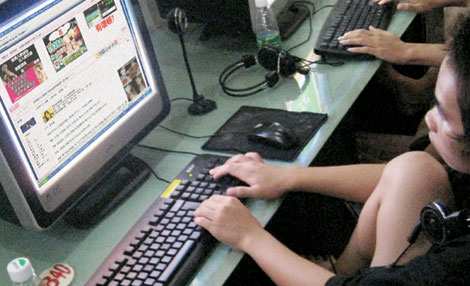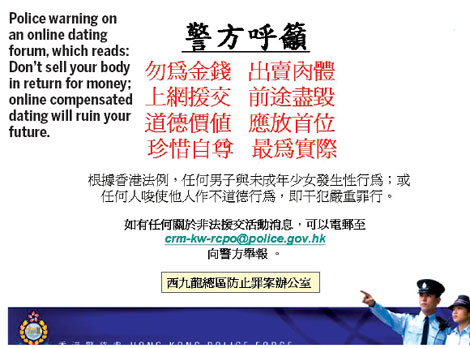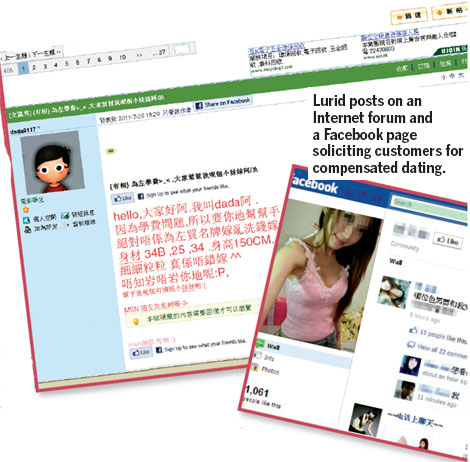Dangerous game
Updated: 2011-07-28 07:26
By Ming Yeung(HK Edition)
|
|||||||



The issue of compensated dating continues unabated in Hong Kong, despite the fact that participants in this form of prostitution involving young students face personal
perils, as well as the threat of criminal records which may dog them for the rest of their lives. Ming Yeung reports.
The whole idea was to make some extra money to help her get through college. Oddly the whole thing began in the summer of 2008, when Apple, as we will call her, learned of the grisly slaying of 16-year-old Kiki Wong, murdered by a man Wong met on an Internet website that specialized in "compensated dating".
Anyone would expect that the tragic story of a young woman's death at the hands of someone she had met on a dating site would serve as a lesson to others. Perhaps it did for some but to others the case drew attention to the fact that young women were making a lot of money from compensated dating - prostitution involving young women who offer dating and sexual services in exchange for money or presents.
Beyond the brutal reality of the slaying came the realization that the number of teenagers engaged in so-called compensated dating was rising quickly.
Apple saw her opportunity to make money. She advertised compensating dating services on line. The dreams of plenty of extra money for the college student, majoring in business, were quickly dissipated when she was busted, as one of 23 people picked up by police in "Operation Whale Diver", a 2008-2009 police crackdown on compensated dating.
Apple, her record blotted by a conviction for "soliciting for an immoral purpose" got a year's probation. But that wasn't the end of it. At college, she had been taking a higher level business course that would require that she be licensed to work in her chosen field. That became impossible with a criminal conviction on her record. Her hard work was wasted. She was left with no choice but to choose a different major and a different career path.
Compensated dating, or enjo kosai, can be traced back to the early 1990s in Japan. Like many of her peers, Apple began the paid-for-escort service by getting in touch with customers via online forums. She said she charged HK$1,000.
The online forum was a platform for men seeking young girls, and at the same time, it was also a hook for investigators to snare the purveyors of these sexual services. Apple remains bitter toward the police. She feels she was a victim of entrapment.
Apple recalled she was first approached online by a man, whom she later found out was a police officer, asking her the price she charged and what services were included in the date.
About two weeks later, another officer contacted her by instant messenger and agreed to a price for sex before they finally met one evening at a park in Tsim Sha Tsui.
The spectacled gentleman, who looked like an ordinary office boy, told Apple he had forgotten the price for their arrangement.
"He claimed that he had not had enough money with him. If I didn't let him know the price, he would not know how much he ought to withdraw from the ATM," Apple told China Daily.
Apple was suspicious because very few customers would actually forget the details and, most importantly, would dare to bring up the topic in a public place.
After she was asked a few times, she whispered the price and services to his ear.
On the way to a nearby ATM machine, a dozen plain-clothed officers swarmed over her like a bees to a hive, she said. She was whisked into a police station for questioning.
Stunned and scared, Apple was told that she could go home if she "cooperated". She was frisked and a pack of condoms was ferreted out which she said was a gift from her boyfriend.
"Is it going to be used for the deal? If the man has not prepared condoms, will you use it?" Apple remembered a policeman asking.
She told him she would use it "for the sake of protecting herself".
Apple said she was too tired to go through the details and signed her name, only to learn later that in the trial, the pack of condoms was served as evidence and in the testimony showing she bought the condoms for the business.
Apple reminisced that her attorney pointed out the inconsistency of the testimony but the judge dismissed the argument, citing "the police is an honest and reliable witness".
Many people, however, agreed with Apple that arresting the girls in undercover sting operations was an infringement on their human rights.
A Hong Kong Law Society report entitled "Entrapment, Human Rights and Criminal Justice: A Licence to Deviate?" published in 1999 pointed out the dilemma of entrapment in terms of: "Manna from heaven or fruit of the poisoned tree?"
A member of the Law Society's Criminal Law and Procedure Committee explained that the courts normally would not be concerned with how evidence was obtained, which is to say, the court would not exclude evidence obtained as a result of police undercover work.
The report concludes: "Clearly more must be done by law enforcement officials, as well as the judiciary and the legislature, to ensure that undercover policing upholds the rule of law and respects human rights."
Police, when queried on the subject, responded that the department would not comment on operational issues. A spokesman added: Police "do not keep figures on complaints against police officers related to undercover operation".
The factor that may easily be overlooked, however, is that police have a responsibility to protect the young women as well. "The aim of the undercover operations is not to arrest the girls, but to find out if the trade is harnessed by syndicates," explained Lam Kin-keung, a retired detective station sergeant now studying criminology.
"Police conduct entrapment tactics only when investigations are difficult to carry out," he said.
Lam said the stings are typically intended to crack down on crimes that have huge social impact such as prostitution and drug dealing.
"But the operation was not directed against anyone in particular," he said.
Kenneth Wong, defense counsel for some of the compensated daters prosecuted by the government, said: "It turned out to find that the girls were mainly 'self-employed'. Therefore, the only possible action was to charge the girls with 'soliciting for an immoral purpose'."
Wong said police have the right and discretion to carry out undercover operations, but it was "disputable" whether the law could be applicable to compensated dating scenarios.
There are two criteria for bringing charges: that the person is in a public place or in view of the public, such as being on streets or in restaurants, and that the person solicits for any immoral purpose.
Wong pointed out since the girls first got to know their customers on the Internet, which is not a public place, and thus "it really did not matter who played the soliciting role".
"When they met in a public place, they only completed the arrangements to which they had agreed on the net," Wong said.
But the senior prosecutor from the Department of Justice, who brought the accusations against the compensated daters, disagreed and insisted "the deal agreed on the Internet is not a firm agreement" and "soliciting was a continuous act until they met in a public place".
The Law Society member commented: "In Hong Kong, entrapment cannot be a defense used by persons charged with whatever crimes."
However, despite warnings on dating websites discouraging compensated dating, there are still plenty of offers.
Apple, in addition to being put on probation, was fined HK$3,000 and left with a criminal record, a scar she may bear for a lifetime, didn't give up on compensated dating.
She said she needed the money to pay for the three-year course she took up after she was convicted - adding she wouldn't have had to take the course if she had not been prosecuted in the first place.
"It's like a vicious circle," she said. "I felt like my future was doomed and no one would hire me if they found out I have a record," she said.
She has enrolled in a different business program. She will be graduating next year, when the record will be spent under the Rehabilitation of Offenders Ordinance.
Asked if she was afraid to be caught the second time, she said she couldn't be bothered, but she would remember not to mention the price again in a public place.
"Arresting the girls may not necessarily mean damaging their future," Lam Kin-keung insisted.
"Follow-up assistance such as counseling will be provided."
Project Officer Bowie Lam from Teen's Key, an organization providing assistance to young sex workers, criticized that problems adult compensated daters encounter are being disregarded.
"The government only offers help to underage girls, especially those who get involved with drugs," Bowie Lam said.
"The core problem - why these girls are engaged in compensated dating - remains unresolved. They will still do it even after prosecution."
Another 19 people were arrested during "Operation Graphite" in 2010, of which 14 were charged with "control over persons for purposes of prostitution" and related offenses.
Prevention is better than cure, said the police.
The police spokesman said the Regional Crime Prevention Offices organize seminars for schools and youth associations urging youngsters to be vigilant when making friends or surfing the Internet and not to disclose personal particulars to strangers or meet any persons they don't know.
They also call on parents "to better communicate with their children and pay attention to their behavior, especially to web-surfing activities".
(HK Edition 07/28/2011 page4)